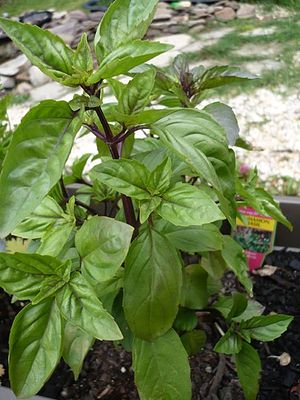Note: This is a project under development. The articles on this wiki are just being initiated and broadly incomplete. You can Help creating new pages.
Ocimum basilicum - Basil leaves
Basil leaves also called great basil. Ocimum basilicum is a culinary herb of the family Lamiaceae. This medicinal herb can help with flatulence, lack of appetite, cuts, and scrapes. Harvest the young leaves of this annual plant as needed.
Contents
- 1 Uses
- 2 Parts Used
- 3 Chemical Composition
- 4 Common names
- 5 Properties
- 6 Habit
- 7 Identification
- 8 List of Ayurvedic medicine in which the herb is used
- 9 Where to get the saplings
- 10 Mode of Propagation
- 11 How to plant/cultivate
- 12 Commonly seen growing in areas
- 13 Photo Gallery
- 14 References
- 15 External Links
Uses
Colic, Constipation, Anxiety, Sleep difficulties, Migraine, Fever, Cold, Arthritis, Cough, Bad breath.
Parts Used
Chemical Composition
Concentrations of linalool and methyl chavicol (estragole), in a ratio of about 3:1. Other constituents include.[1]
Common names
| Language | Common name |
|---|---|
| Kannada | Tulasi |
| Hindi | Ban tulsi, Jangli tulsi |
| Malayalam | Thulasi, Sivathulasi, Krishnathulasi |
| Tamil | Tulaci ilaikal |
| Telugu | Tulasi akulu |
| Marathi | NA |
| Gujarathi | NA |
| Punjabi | NA |
| Kashmiri | NA |
| Sanskrit | Thulasha |
| English | Basilie, Sweet Basil |
Properties
Reference: Dravya - Substance, Rasa - Taste, Guna - Qualities, Veerya - Potency, Vipaka - Post-digesion effect, Karma - Pharmacological activity, Prabhava - Therepeutics.
Dravya
Rasa
Tikta (Bitter), Katu (Pungent)
Guna
Laghu (Light), Ruksha (Dry), Tikshna (Sharp)
Veerya
Ushna (Hot)
Vipaka
Karma
Prabhava
Habit
Identification
Leaf
| Kind | Shape | Feature |
|---|---|---|
| Simple | Silky | Fresh basil leaves have a strong and characteristic aroma, not comparable to any other spice, although there is a hint of cloves traceable |
.[3]
Flower
| Type | Size | Color and composition | Stamen | More information |
|---|---|---|---|---|
| Unisexual | 2-4cm long | White | 4 | Flowers are arranged in a terminal spike. Flowering from September to November |
Fruit
| Type | Size | Mass | Appearance | Seeds | More information |
|---|---|---|---|---|---|
| Nutlets | 5-6 | 4 with persistent caly x | Fruiting from September to November |
Other features
List of Ayurvedic medicine in which the herb is used
- Vishatinduka Taila as root juice extract
Where to get the saplings
Mode of Propagation
How to plant/cultivate
Basil grows between 30–130 cm (12–51 in) tall, with opposite, light green, silky leaves 3–11 cm (1.2–4.3 in) long and 1–6 cm (0.39–2.36 in) broad.
Commonly seen growing in areas
Tropical area, Mediterranean region.
Photo Gallery
References
- ↑ Cultivation
- ↑ Cite error: Invalid
<ref>tag; no text was provided for refs namedKarnataka Medicinal Plants - ↑ Kappatagudda - A Repertoire of Medicianal Plants of Gadag by Yashpal Kshirasagar and Sonal Vrishni, Page No. 282
External Links
- Pages with reference errors
- Ayurvedic Herbs known to be helpful to treat Colic
- Ayurvedic Herbs known to be helpful to treat Constipation
- Ayurvedic Herbs known to be helpful to treat Anxiety
- Ayurvedic Herbs known to be helpful to treat Sleep difficulties
- Ayurvedic Herbs known to be helpful to treat Migraine
- Ayurvedic Herbs known to be helpful to treat Fever
- Ayurvedic Herbs known to be helpful to treat Cold
- Ayurvedic Herbs known to be helpful to treat Arthritis
- Ayurvedic Herbs known to be helpful to treat Cough
- Ayurvedic Herbs known to be helpful to treat Bad breath
- Herbs with Seeds used in medicine
- Herbs with Leaves used in medicine
- Herbs with common name in Kannada
- Herbs with common name in Hindi
- Herbs with common name in Malayalam
- Herbs with common name in Tamil
- Herbs with common name in Telugu
- Herbs with common name in Sanskrit
- Herbs with common name in English
- Habit - Shrub
- Index of Plants which can be propagated by Seeds
- Index of Plants which can be propagated by Cuttings
- Herbs that are commonly seen in the region of Tropical area
- Herbs that are commonly seen in the region of Mediterranean region
- Herbs
- Ayurvedic herbs that don't have seed photos
- Lamiaceae


